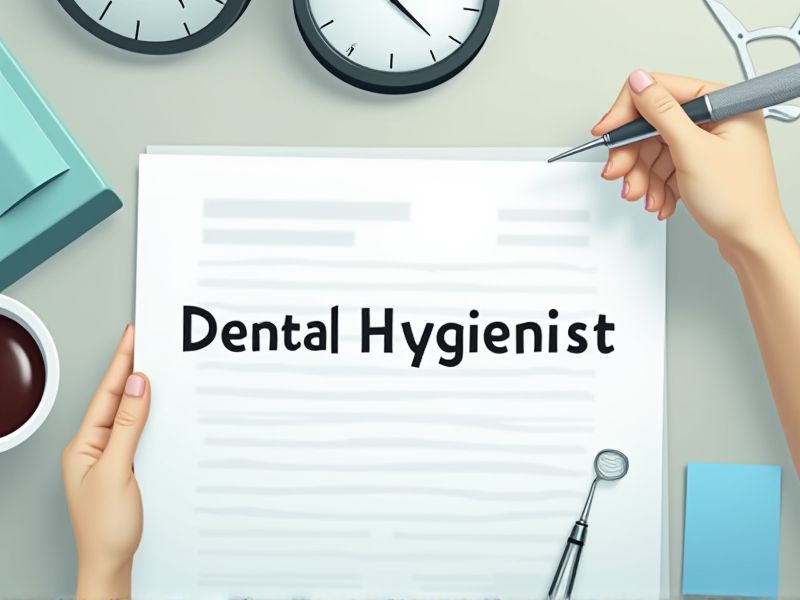
Dental hygienists play a crucial role in maintaining oral health, requiring a deep understanding of dental procedures and patient care. Acquiring specific certifications ensures they possess the necessary skills to perform these tasks effectively and comply with legal standards. Certifications validate their expertise, increasing patient trust and job market competitiveness. Here are some essential certifications required for dental hygienists.
Registered Dental Hygienist (RDH) License
The RDH license ensures the dental hygienist meets the standardized qualifications necessary for safe patient care. It provides a legal framework that holds professionals accountable for maintaining competence and ethical standards. Licensing enhances public trust by verifying the hygienist's expertise and adherence to best practices. The RDH credential opens career opportunities and enables participation in the broader dental health community.
CPR/AED Certification
CPR/AED certification is essential for dental hygienists because they often work directly with patients, who may experience medical emergencies during procedures. Understanding CPR techniques enables them to respond effectively to cardiac arrest situations, ensuring patient safety. AED training equips them with the skills to use defibrillators, which can significantly increase survival rates. Regular certification renewals ensure that dental hygienists remain current with the latest resuscitation guidelines and practices.
Local Anesthesia Certification
Local anesthesia certification allows dental hygienists to perform procedures that require patient comfort and pain control, leading to improved patient experiences. Without certification, they are limited to non-invasive tasks, which restricts their capability to assist in more complex dental procedures. Certified dental hygienists enhance the dental team's efficiency as they can prepare patients and administer anesthesia, freeing up dentists to focus on diagnostic and surgical responsibilities. In many states, regulatory bodies require this certification to ensure that hygienists are properly trained, reducing the risk of complications associated with anesthesia administration.
Dental Radiography Certification
Dental Radiography Certification ensures dental hygienists are proficient in taking accurate and safe dental x-rays, which is crucial for effective diagnosis and treatment planning. Proper certification minimizes patient exposure to radiation by promoting adherence to safety protocols. Certified dental hygienists can enhance workflow efficiency, allowing dentists to focus more on diagnosing and treating patients. Certification can also lead to expanded career opportunities and increased trust from patients and employers.
Infection Control Certification
Infection Control Certification ensures dental hygienists maintain a high standard of safety, reducing the risk of cross-contamination and infection among patients. By adhering to certified protocols, dental practices are more likely to pass health inspections, maintaining their licenses and reputation. Proper infection control measures can decrease the incidence of healthcare-associated infections, leading to better patient outcomes. Certification also enhances a dental hygienist's professional credibility, potentially leading to career advancement opportunities.
OSHA Certification
OSHA certification for dental hygienists ensures compliance with health and safety standards, reducing the risk of workplace hazards like exposure to infectious diseases. This training helps create a safer working environment, protecting both dental professionals and patients. Enhanced knowledge of safety protocols leads to more efficient practice management and minimized liabilities. Employers often prefer OSHA-certified hygienists, as it signifies readiness to adhere to proven safety practices.
Oral Health Education Certification
Oral Health Education Certification enhances a dental hygienist's ability to effectively communicate preventive care practices to patients, leading to improved oral health outcomes. This certification equips hygienists with advanced skills in patient education, thereby increasing patient compliance with recommended oral care routines. Evidence suggests that comprehensive education can decrease the prevalence of dental diseases, affirming the need for certified expertise. Additionally, employers value certified dental hygienists as they contribute to the practice's reputation for high-quality patient care.
Continuing Education in Periodontology Certification
Continuing education in periodontology equips dental hygienists with the latest knowledge and techniques for managing periodontal disease, which affects nearly half of adults over 30, enhancing patient care. Advancements in periodontology can lead to more effective treatment plans, reducing long-term oral health issues and associated systemic conditions. Certification can increase a hygienist's expertise, leading to better job opportunities and potentially higher salaries in the competitive dental field. Keeping current with evolving technology and research allows dental hygienists to provide evidence-based recommendations and interventions, thereby improving patient trust and outcomes.
First Aid Certification
First Aid Certification ensures that dental hygienists can respond effectively to medical emergencies that might arise during dental procedures. Possessing this certification increases patient trust, knowing that the dental professional is prepared for unexpected situations. Understanding first aid allows hygienists to better manage situations like allergic reactions or choking incidents in the dental office. It aligns with regulations and standards that mandate safety preparedness in healthcare settings.
IV Sedation Assistance Certification
IV Sedation Assistance Certification ensures that dental hygienists have the necessary skills to safely support procedures requiring sedation, minimizing patient risk. Dental procedures often require precise pain management; certification allows hygienists to understand and monitor sedation levels effectively. Proper training ensures compliance with legal guidelines and regulations, enhancing the practice's overall safety. Certified dental hygienists can improve patient experience by helping maintain a calm and controlled environment during sedation-assisted treatments.
Summary
You will likely notice enhanced career opportunities and professional growth when a Dental Hygienist obtains additional certifications. Certification increases a professional's skill set, making them more attractive to employers and potentially leading to better job prospects. Enhanced credentials can lead to higher earning potential and increased job security. Patients may also feel more confident in their care, contributing to greater trust in the dental practice.
